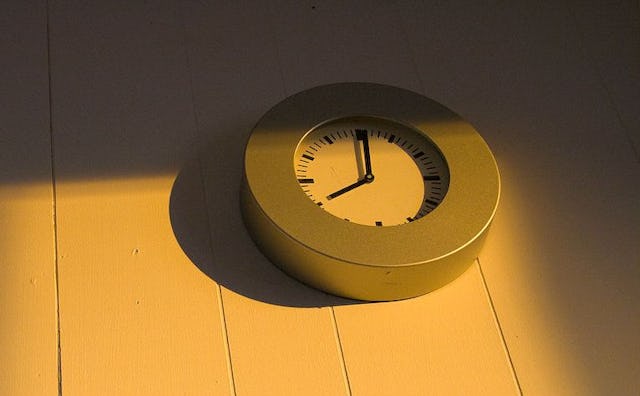Let's Change Daylight Savings So We Lose an Hour of Work, Not Sleep

Here’s how it goes now. You go to bed on a Saturday night—and while you’re sleeping, you’re cheated. Time disappears. At 2 a.m., we all skip forward an hour. When you wake up the next morning, you’re still half-asleep. If you’re a church-goer, you’re late. If you’re a brunch-goer, you’re groggy. If you’ve got kids, you’re robbed of the right to tell them to go back to bed.
I’m certainly not against the idea of turning the clocks back. I love sunlit evenings, and I’m willing to sacrifice a little bit of morning sunshine when most of us are just commuting anyway. But I have a suggestion to make the whole thing more palatable. It’s simple, it’s straightforward, and I think you’re going to love it.
Instead of losing an hour of sleep, let’s skip an hour of work.
I’m open to suggestions as to which hour, exactly. It probably shouldn’t be right at the start or the end of the workday. I don’t want to put us all in a situation where parents forget to turn the clock ahead at 4 p.m. and thus show up an hour late at day care, or ruin everyone’s commute in the morning.
But to get us started, here are three ideas:
Monday, 11 a.m.
Pros: Everyone needs a boost on Monday. People would be at work, singing the start-of-the-workweek blues, when we’d suddenly all fast-forward to lunch.
Cons: If you get off to a late start on this particular Monday, it’ll be like pouring gasoline on the fire of unproductivity.
Wednesday, 1 p.m.
Pros: It’s hump day to begin with. This time you might come back to work after lunch and find that your workday is an hour closer to being done than your body expects.
Cons: Wednesday might be the most productive day of the week normally. We probably shouldn’t risk ruining the economy over this.
Friday, 4 p.m.
Pros: We all have weeks when we just can’t wait for the weekend to arrive. This way, it actually would arrive sooner.
Cons: We’re running straight into the potential problem of end-of-the-day confusion here, so we’d be counting on the media to make sure people are thinking about it all week. I’m pretty confident in their ability to create a little hype.
An important closing note: I’m only advocating moving the hour we lose to the workweek. In the fall, I think we should continue to gain an hour on the weekend—and while we’re sleeping seems to work just fine.
Sound like a good idea? If so, let’s start a movement. Spread the word, and let’s see if in a year or two we can move America to a program of Daylight Savings Time sanity.
This article was originally published on